American lawyer Kimberle Crenshaw first proposed the concept of intersectionality in 1989, when she published a paper in the University of Chicago Legal Forum titled Demarginalizing the Intersection of Race and Sex. She argued in the paper that the law seemed to forget that black women are both black and female and thus subject to discrimination based on both race, gender, and often, a combination of the two. “We tend to talk about race inequality as separate from inequality based on gender, class, sexuality, or immigrant status. What’s often missing is how some people are subject to all of these, and the experience is not just the sum of its parts,” Crenshaw said. Her theory gained acceptance gradually and received widespread attention during the 2017 Women’s March, where organizers noted how women’s intersecting identities meant that they were “impacted by a multitude of social justice and human rights issues.” In the anthology Ajeeb Daastaans, Neeraj Ghaywan weaves in intersectionality in his film Geeli Pucchi. There is Bharti Mandal (Konkona Sensharma) who is a woman, a queer, and a Dalit. She faces discrimination at work and in life by virtue of her three identities—gender, caste, and sexuality. She works in a factory. She is often treated with rudeness by her coworkers and managers and does not even have a separate toilet. Despite having the right qualifications, she is not selected for the post of data operator. A new upper-caste woman, Priya Sharma (Aditia Rao Hyadri), is hired for the position.

Geeli Pucchi also uses the theme of food throughout its narrative to bring out the differences between its characters. The relationship between Bharti and Priya begins when Priya comes down to the canteen (interestingly positioned) and has lunch with her on her first day at work. Priya offers Bharti the stuffed okra that she brought from her home, but she refuses. Bharti eats food from her square steel lunchbox. Priya then asks Bharti about toilets for women, but she curtly replies that there are not any women around to have separate toilets, forgetting that she, too, is a woman. Later, the friendship of Priya and Bharti starts to blossom and they go to have dahi vada. Priya asks the shopkeeper not to add saunth to the plate for Bharti while asking him to add saunth and make it spicy on her plate. The camera pans to the two dahi vada plates (like the earlier instant when workers took food from the factory). A similar scene was also seen in the beginning moments of the friendship between Deepak (Vicky Kaushal) and Shalu (Shweta Tripathi) in Neeraj Ghaywan’s debut film Masaan. Vicky and his friend gifts a teddy bear gift to Shalu’s friend while they are having a snack on the road. Shalu is arguing with the seller that he had not added enough chutney.

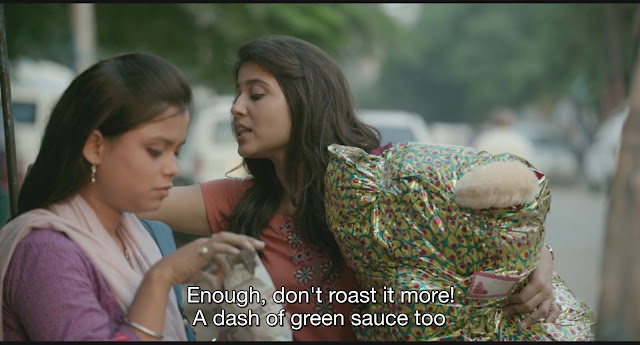
Bharti and Priya then become good friends. They now have lunch together. Priya offers Bharti food again from her spoon. Bharti feels a bit shy but then eats it. Later in the film, Priya invites Bharti to have lunch in her chhota sa kona where no men are allowed. This time, even Bharti offers her lunch to Priya. This shows the different stages of their relationship through food.

There are more food-related scenes in the film that bring out the associated caste-related prejudices. Bharti invites Priya to her home, where she makes chicken for her. Priya is not allowed to have it in her house as upper-caste religious families avoid non-vegetarian food due to notions of impurity associated with it. The film’s title Geeli Pucchi, meaning sloppy kisses, is also based on this when Priya kisses Bharti’s hands after she tastes the chicken made by her. The aspect of eating vegetarian food in an upper-caste household is further depicted during Priya’s birthday. Her husband announces to everyone that his mahant father does not eat eggs. Therefore, he makes an eggless barfi cake to celebrate the birthday of his wife.
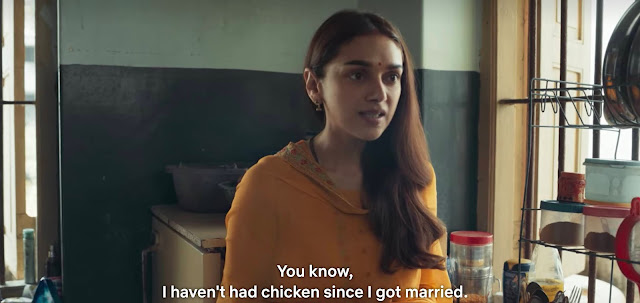
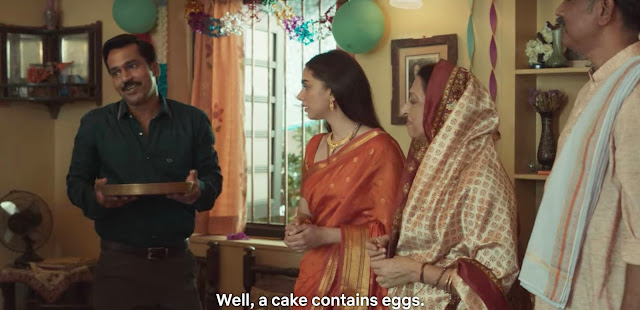
An actual cake is later cut for Priya at work, where her manager and colleagues celebrate her birthday. Bharti is not invited to the celebration as Priya asks her to remain outside. A heartbroken Bharti watches the proceedings from outside. After a while, she is called in to distribute the cake to all other factory workers. One of the men puts a soiled napkin on the serving plate, which disgusts Bharti. She is treated with little respect.
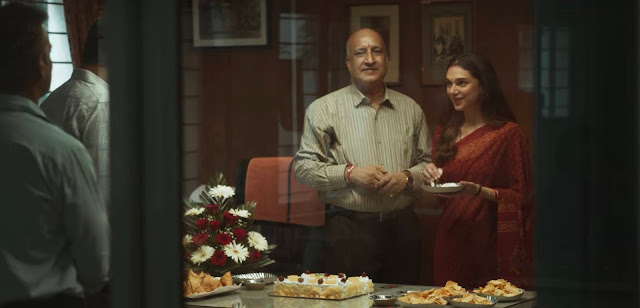

In the film’s final moments, Bharti comes to visit Priya after the birth of her baby. Priya’s mother-in-law asks her to convince Priya to leave her job. Bharti is offered tea in a different steel cup. It is a common practice in many households to keep separate sets of utensils for lower-caste people. It is worth noting that Geeli Pucchi starts on a note of sharing of utensils and food concludes on a note of separation of the same. Earlier this year, Umesh Bisht’s Pagglait had a scene where the Muslim friend was offered tea in a different cup by the Hindu family. Kiran Rao’s Dhobi Ghat also had this scene where Munna (Prateik Babbar) meets Shai (Monica Dogra) at her apartment, and her domestic help serves him tea in a glass while bringing a ceramic mug for her. Shai is embarrassed and reverses the serving.
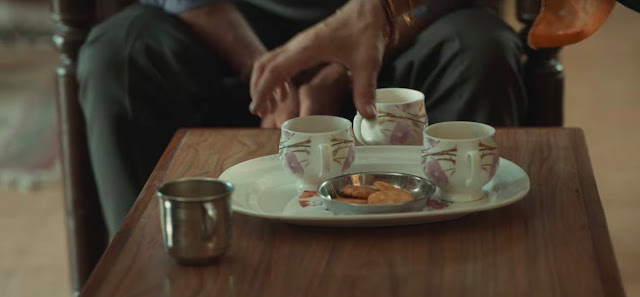
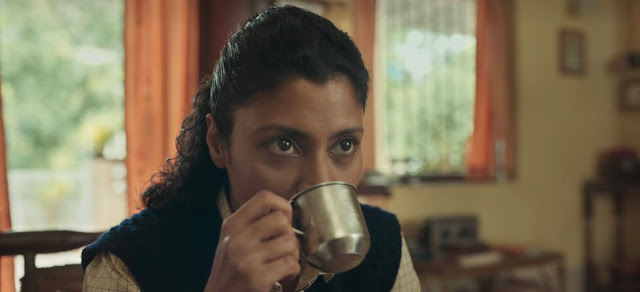
Geeli Pucchi also depicts many contrasts between Bharti and Priya. Bharti lives by herself in her house. Her only companion is the street dog. Priya stays with her family in a place where there is not much space, and she sleeps on the floor with other family members. She and her husband do not even have a few moments of privacy as they have sex in the bathroom. (This lack of space is something that Alankrita Shrivastava has also depicted recently in both her films Lipstick Under My Burkha and Dolly Kitty Aur Woh Chamakte Sitare.) In another contrast, Bharti chooses to dress the way she wants in line with her butch personality and wears darker shades. Priya, on the other hand, is dressed in traditional feminine attire in brighter colors. At one stage, her mother-in-law helps her wear a saree while warning her to maintain a friendship only with people of a similar stature symbolically representing that Priya is not really free and bound by the rules of her family.

While Masaan left one with a punch in the gut and ended on a note of poignance, Geeli Pucchi feels a little distant. Maybe, it was because the characters and their actions lay in the zone of grey which prevents them from being fully embraced. None of them are victims, or all of them are victims. However, the one thing that unites Neeraj Ghaywan’s characters is their loneliness of love. Deepak and Devi from Masaan and Bharti from Geeli Pucchi mourn the death of a relationship that could have been so much more and possibly could have changed their future. But life had future plans. Like they said in Masaan, “Mann kasturi re, jag dasturi re, baat hui na poori re.” Like the musk deer, the heart doesn’t get closure.

[Read more of the author on his blog here]

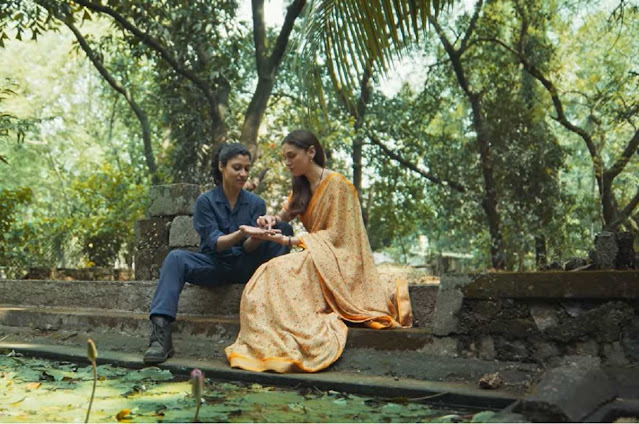




Leave A Comment
You must be logged in to post a comment.